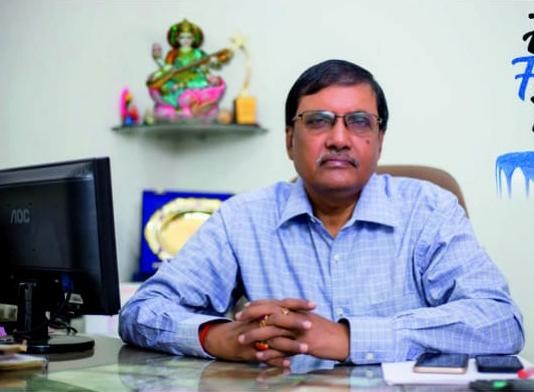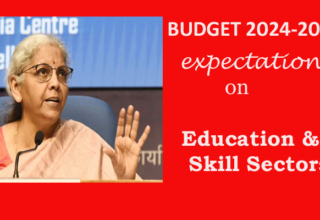
‘The greatest challenge lies in the adaptability to a completely unexplored mode of teaching-learning. No matter what we have done, we need to do even better to reach out, to help, to ensure students never stop learning.’
By Indrani Bhattacharyya

According to the official reports published in 2017-18, only 29% of the Indian population were internet users. Though the statistics have vastly changed and as of 2020, around 50% Indians have access to the internet, yet a large section of the students community especially in semi-urban and rural areas still belongs to places where internet penetration is still pending. Young people’s access is even less. A recent news report stated that only 12.5 % of the students in our country have access to the internet. Even in areas with internet accessibility, connectivity issues and availability of the suitable devices still prevents schools to actually implement ‘online teaching’. In several such places, even the most well-intentioned teachers and schools do not have means to reach out to most of the students.
However, in schools where ‘online teaching’ is going on, the challenges are no less. Availability of resources, unpreparedness for the situation, lack of books, lack of technical knowhow, poor bandwidth, all play significant roles in creating barriers in the implementation of this ‘best of the lot’ solution. In case, one managed to overcome all these challenges too, the greatest challenge lies in the adaptability to a completely unexplored mode of teaching-learning. One needs to look at the situation with a little empathetic eye and not be over-critical of the average teachers, who for all their lives have belonged to an education system where performance in an examination has always determined the quality of the student and not the participation, effort or even competence. Teachers who have always been trained to ‘complete the syllabus and drill’ and in the most enlightened cases, a handful of them have been trained to make the ‘classroom’ more engaging and student-centric.
With such lifelong training and resources at hand, with very little confidence at handling technology when suddenly these teachers are made to shift mode to virtual teaching, it’s natural to feel like a fish out of the water. In such a situation, they fall back to the basic mode they are most acquainted with – read and explain to ‘complete the syllabus, without the realisation that without textbooks and proper measures to follow-up and evaluate this method is simply ineffective. In the last few weeks however, we have seen a flurry of activities by the Ministry of Human Resource Development (HRD) and various regulators including CBSE, NCERT etc. to find alternative measures to ensure the continuation of education but the implementation of such measures still remains vague and ambiguous.
My own experience has taught me so much
At Krishnagar Public School, Nadia, West Bengal, we started with ‘online teaching’ right from 25th March 2020, a couple of days after lockdown started, as a result of the far-sightedness of our Principal Sir, Dr. Sankar Prasad Dutta, who predicted right at that very moment that this new mode was “here to stay” and had that “it’s time we adapt ourselves accordingly” with Class X and XII students, and then gradually incorporated all grades across Pre-Primary to Senior Secondary. It is high time we test the effectiveness of those measures and give some perspective. To begin with, we ensured students got their books on time. Since, printed books could not be provided during the lockdown, we negotiated with the publishers to ensure that we could provide all our students from Pre-Primary to Senior Secondary receive the e-texts of the books prescribed in their curriculum. We diligently trained our teachers to use the Webinar Applications, briefing even the minutest of features and sharing ideas as to how to use those simple features to ensure continuous feedback in the class. We converted simple and freely available digital resources like Google Forms to create quizzes and assessments from where scores and feedback could be directly shared via mail.

They say, it takes a village to raise a child. Our chairman Mr. Naresh Chandra Das, who believes in this vision, enlightened us with the idea that if it takes the community to teach a child, and we can’t reach the child directly, then we must empower the community to ensure disruption-free learning for all children. Since then we are constantly trying to empower the parents and families so that they can in turn provide them with support, guidance and encouragement. We have started regular Parent Connect Programmes to reach out to our parents and provide them with necessary perspectives to ensure students are nurtured in a happy and healthy atmosphere. We are also conducting regular Spoken English, Yoga and Life Skills Sessions with our parents to help them stay relaxed in the face of such distress and learn certain basic skills and ideas that will even help them in parenting millennial kids with ease. We even started Interaction Time and Virtual PTMs to get feedback from parents across grades and to modify our approach and ways to help the students better.
In a school where several of the students come from economically challenged extremely rural, interior backgrounds and travel 30-40 kms each way to commute daily, availability of enough digital devices to incorporate all students into the system of ‘online teaching’ still remains a challenge. Since we do not have enough resources to help them out directly, we are writing to various telecom and electronic companies requesting them to come to their aid by providing them with basic devices and tools so that these children are not deprived of their opportunity to learn.
We are dedicating our entire time planning to gradually shift to an alternative educational experience – focussing more on skill, competence, and effort than on marks, grades and percentiles. We are trying to introduce simple assignments through celebration of certain events and culturally important days, that will not only help students appreciate our rich cultural heritage, but also ensure they widen their horizon by their research work, assimilate information instead of simply accommodating them temporarily by rote-learning, develop finer aesthetic sense, learn to express themselves better, honing their speaking, writing skills, integrate art in their work, yet enjoy and get a sense of accomplishment.
A few examples:
For example on 29th June, on the occasion of Camera Day, we introduced a competition for students from Class V to Class XII in three groups. Class V to VII had a Creative Writing Competition wherein they needed to bring out the significance of the invention of the Camera, but the challenge was the form of writing was not specified, rather they were encouraged to explore. The entries that we finally received took us by surprise too! We had expected autobiographies and diary entries but several students came up with limericks, calligrams, dialogue writing (between an old portrait and a photograph) and short short. One even wrote an ‘Ode to a Camcorder’ that simply stunned us. Maybe it wasn’t completely an ‘ode’ yet, but just the idea from a 12 year old to write an ode to a gadget and incorporate its significance in rhythmic and logical sequence was worth praise. In the senior segment from Class XI to XII who had a Short Film Contest for the same event, on the theme of ‘Effects of Corona’, the final products they shared simply using a smartphone and in some cases very basic video editing application left us wondering.
What we concluded was that when we challenge the boundaries of our students by well planned interdisciplinary projects, they in turn challenge themselves and some up with such stunners. We also recently conducted our Mock Parliament (Link to Virtual Invitation to the Event: https://www.youtube.com/watch?v=oEslBsoD-EA ) on the occasion of the International Day of Parliamentarism on 30th June 2020 where our students delegated as imaginary MPs from both ruling as well as opposition parties and presented a busy day in the Parliament (Link to the Mock Parliament Session: https://www.youtube.com/watch?v=uzVfJfngBCE ). It was not only a display of oratory skills and awareness in current affairs but a wide array of research activities was involved. The young students displayed such complex yet versatile human traits through their speech, for instance the Speaker of the House, though soft spoken and too sophisticated to really match her voice with the rest of the chaotic MPs in loudness yet firm and commanding in expression, a powerful personality whom none of the MPs dare to defy. Of course, such precision did not come about in one day, it took weeks of practice and the teachers’ dedication to reach out to the students to assist their speech even through normal voice calls where bandwidth did not support.
Conclusion
The school closures due to COVID-19 and the other related challenges have been a huge learning experience for us. It has taught us humility, self-doubt, and not to be content with our efforts. It has made us believe that no matter what we have done, we need to do even better to reach out, to help, to ensure our students never stop learning. Our experience with this ‘distance mode of learning’ has taught us that we must liberate learning from outdated curricula and the disproportionate emphasis on mere transfer of information.
The author is Headmistress (secondary), Krishnagar Public School, Nadia










